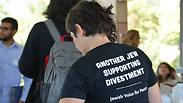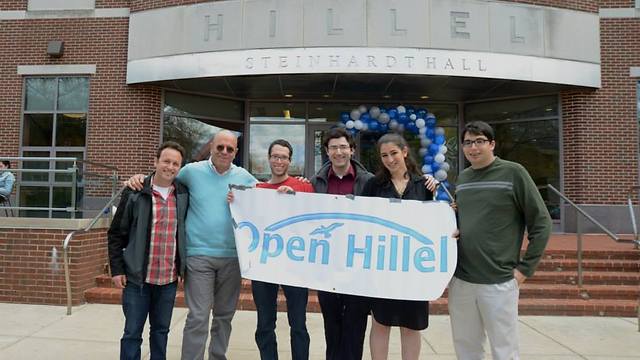
The problem with Open Hillel
Op-ed: By seeking to introduce open debate and the inclusion of different opinions, Open Hillel is only giving voice to more of the same: Boycotting Israel and propaganda of lies. A true Open Hillel should fight against silencing pro-Israel voices.
Over the past few months I have been visiting American campuses. I’ve also met with students who are affiliated with Open Hillel, an initiative that wants, or so they claim, to allow for a little more openness to criticism against Israel at Hillel clubs on campuses. The initiative has been publicly backed by a group of professors.
There's no doubt that "openness," "the freedom of expression," and "inclusion" are important components in any student and academic activity. There's no doubt that students and lecturers who deviate from the song of the choir and voice different opinions need a lot of courage. There's no doubt that barring irritating positions is against the principle of free thinking. So every initiative that wants to broaden the canvas in order to allow for public discussions that encourages the plurality of opinions rather than a limitation of opinions - should be welcomed.
The thing is, every text has a context. And the context is that on many campuses in the US, there are many groups like Students for Justice in Palestine (SJP), Islamic associations, Jewish Voice for Peace (JVP), and many others. They have a lot of power. They act, sometimes with violence, against Israelis coming onto campuses. Sometimes it's just because they're Israeli, regardless of their opinions. This phenomenon is called a boycott. The members of these groups, most of whom support the BDS Movement, are the ones behind a campaign to silence other opinions. So an interesting thing is happening here - in order to strengthen "openness" and "inclusion," we seek to open the door to those who use violence against openness.
Facing all of these groups, on some of the campuses, there is one group - only one - Hillel, which is trying to give Jewish students one space - just one - that would be clean of anti-Semitic, anti-Zionist and anti-Israeli propaganda. The three are not always the same thing. In recent years, differences between them have eroded. And now, there are those who seek to take away even this small space, so the exact same anti-Israeli opinions are voiced again - those already voiced over and over again everywhere else.
Has anyone asked JVP to form Open JVP, so the claim can be voiced that real Israel is a little bit different than the one their activists and lecturers told them about? I once met two students from JVP. They were surprised by the facts I presented them with. I've asked them to organize a meeting with all members of their JVP branch. Several days later, they were ashamed to admit that the heads of the group rejected the idea out of hand.
It's the same story in most or all of the other groups. Did anyone seek to form Open SJP in order to voice the fact the Arabs and Palestinians, time and again, rejected any peace initiative based on two states to two peoples? Did anyone ask one of the Islamist associations to present the real picture of Hamas, who calls for the annihilation of Jews and Christians (yes, Christians too. That's what Hamas' TV channel is broadcasting)? Do they know that senior Hamas spokespeople, just like the Islamic State, are preaching the takeover of Rome and America? How many students even know that Hamas' charter calls for the annihilation of Jews?
All of these things are not happening, because there is no open discussion, there's no freedom of expression, there's no inclusion and no openness. In many of the campuses, only one opinion is allowed. Instead of demanding the anti-Israel associations to allow for a broader selection of views, Hillel is being demanded to repeat the venomous anti-Israel propaganda that is already coming from all of the other groups.
The result is that many students, both Jews and non-Jews, are operating in an environment in which they have no basic information about the Middle East conflict. Every involved student knows about the Nakba, the catastrophe, which created the Palestinian refugee problem during the 1948 War of Independence. But how many of them know about the Jewish Nakba? How many know that more Jews were expelled from Arab states? How many of them know they were disinherited of their property? How many of them know that in those years, tens of millions went through the difficult experience of population transfer? And how many know the "occupation" in 1967 was a result of a declaration of war in which both the Arab League and all of the leaders of the Arab states announced their intention to annihilate the Jews? And why weren't they presented with the simple question: Why is it that over the course of two decades - from 1949 to 1967 - when the Gaza Strip and the West Bank were under Arab control, a Palestinian state was not established? After all, Israel wasn't there.
I could go on and on, the list is long. Most students, even those who visit Hillel clubs regularly, don't know the basic facts. That's because there is no open debate. That's because there's an effort to silence other voices. That's because there's a ban on any position that doesn't fit with the opinions of those who want to lead Open Hillel today.

In order to see how it works one must remember, for example, who were the stars of the Open Hillel conference: Prof. Rashid Khalidi, Judith Butler, and Peter Beinart. They belong to the radical end of the spectrum. Some of them support a boycott on Israel. If this is Open Hillel, which demands open debates, why is it that there wasn't a single lecturer - not even one - with a different position? After all, when most of the opinions being voiced on campuses, even by lecturers or student associations, are anti-Israel, then there is an urgent, important and vital need for an open debate. There's a need for an open space, in which students can be told everything they don't know and don't hear because of the ban on any pro-Israel position.
Some of the professors on Open Hillel's academic council are public supporters of the BDS Movement. It's important to clarify: BDS is not against the occupation, and is not in favor of peace with Israel, nor does it support human rights. The BDS Movements, as its main spokespeople - Omar Barghouti and Ali Abunimah - declare openly, is against the very existence of Israel. And the BDS Movement, just as its name suggests, is against having a dialogue with Israelis. The BDS Movement, again as its name suggests, refuses to hear about or allow positions that support peace based on the right of both nations for self-determination. So the BDS Movement is now the biggest enemy of dialogue, the peace process, and open debate. How many students are aware of the BDS Movement's real ideology?
Two months ago I asked two students who support Open Hillel if they ever heard from a pro-Israel speaker, or invited one for a lecture. They looked at each other. They haven't heard from a pro-Israel speaker, nor have they invited one for a lecture. But they were very informed of the claims, most of which are fictitious, against Israel. So where exactly is the "open" part of the name, I asked them. They once again looked at each other. Those who are only exposed to one position are not open minded, they're narrow minded.
And this is how this absurd situation was created. Those who support the boycott and the silencing of differing opinions, are suddenly pretending to be great supporters of open dialogue, inclusion, and of hearing different views.
Israel is a democracy. It's doubtful there is any other country that has the kind of open and piercing self-criticism as in Israel. Yours truly, it's important to note, is no fan of the current government's policies either. When the need arises - I provide piercing criticism. But there is a difference between criticism and propaganda of lies. There's a difference between open dialogue and places where the environment bars different opinions.
The problem with Open Hillel is that it seeks to add more of what already exists: More speakers against Israel, further strengthening the brainwashing against Israel. Those who support an open debate should voice the opposite opinion: No boycotts, no propaganda of lies, but instead an open and fair debate, in which even those who have something good to say about Israel could voice their opinions on campuses without needing body guards.
That should have been Open Hillel's real fight. It's not too late to start.
The writer is the author of the book "The Industry of Lies," which will soon be published in English.










